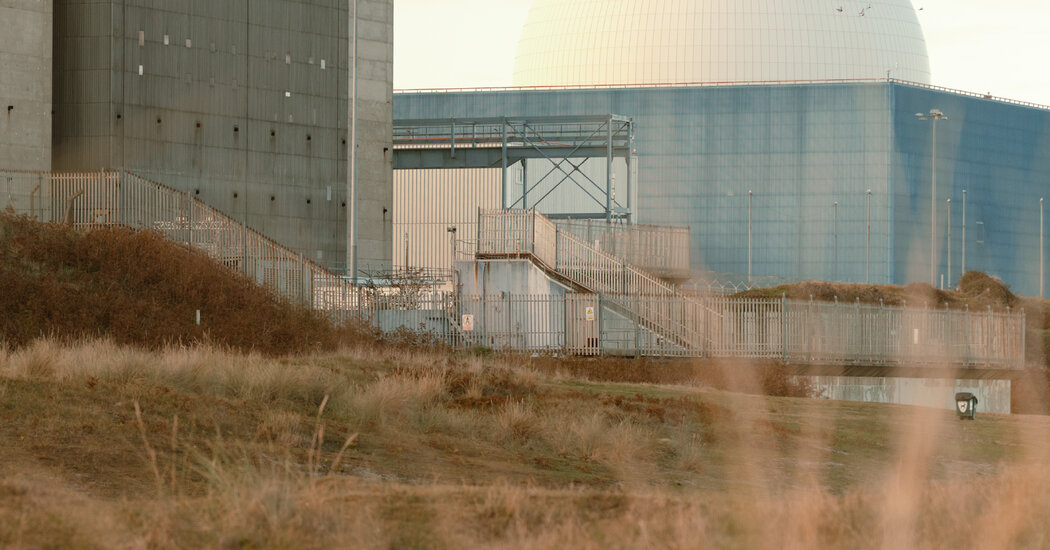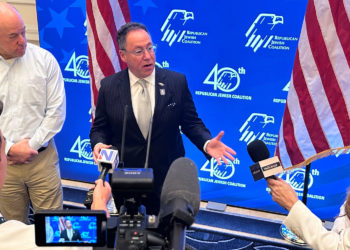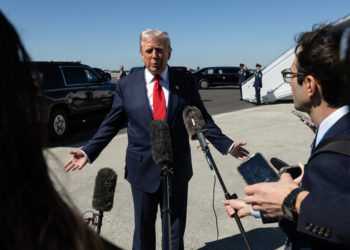In the flatlands of Eastern England, truck after truck rolls through the country lanes. Temporary fences block off farmers’ fields. Archaeologists sift for artifacts.
The source of the disruption is a vast gash in the landscape near the town of Leiston running through hills to a pebbly beach on the North Sea.
A giant nuclear power station called Sizewell C, whose potential construction has loomed over the region for years, is now finally underway. By around 2040, Sizewell C, which will consist of two large reactors, is expected to produce enough electricity to light up six million homes.
An activist group called Stop Sizewell C, led by Alison Downes, has campaigned vigorously against the plant, but government backing made it hard to stop. It will sit on the beach next to a striking blue building with a white dome that houses Sizewell B, the last nuclear power station built in Britain, a project that was completed in 1995.
The stepped-up activity is a milestone for Julia Pyke, Sizewell’s joint managing director and the public face of the giant project.
Ms. Pyke left the London law firm Herbert Smith Freehills Kramer, where she was a co-head of the firm’s power practice, in 2017 to help assemble the financial package that pushed Sizewell C over the line. The estimated price tag is 38 billion pounds, or about $51 billion.
“We have demonstrated that there is high appetite to invest in nuclear,” Ms. Pyke said in an interview in her London office.
Ms. Pyke said she encountered widespread skepticism when she began fund-raising for the project, but nuclear energy’s star has risen. “Attitudes have shifted significantly, for a whole variety of reasons,” she said.
Among them is the expectation that the growth of data centers for artificial intelligence, as well as adoption of electric vehicles, will raise demand for electricity in Britain and continental Europe.
Building nuclear plants also fits with the strategy of the British government, which wants to phase out natural gas. Ed Miliband, the energy secretary, blames Britain’s reliance on fossil fuels for stubbornly high utility bills.
It’s not lost on the government that Sizewell C will also help create thousands of well-paid jobs, including an estimated 8,000 at the peak of the construction phase.
Nuclear plants also provide a steady source of power, known as base load. These plants do not have the drawbacks of wind turbines or solar panels, whose output varies with the breeze and sunlight.
With power fluctuations associated with renewable energy, substantial base load is necessary “so that when the wind doesn’t blow and the sun doesn’t shine, the lights still go on,” said Chris O’Shea, the chief executive of Centrica, a large British utility that has taken a 15 percent stake in the power station.
Yet Britain’s existing nuclear fleet, now just five reactors, is dwindling fast because of age. All but Sizewell B are likely to be retired by the early 2030s.
Ms. Pyke managed to persuade business executives, government officials and financiers that it was sensible to embark on building more nuclear plants despite the difficult recent history of such efforts.
Ms. Pyke has had a firsthand view of that experience. As a lawyer, she represented Électricité de France, the French state-controlled utility that acquired Britain’s operating nuclear plants and potential sites for £12.5 billion in 2009.
That deal led EDF to begin constructing a nuclear power station at Hinkley Point on England’s West Coast. That plant, due to come online in the early 2030s, is years behind schedule and likely to be the costliest of the recent generation of nuclear plants.
Ms. Pyke sees virtues in EDF’s struggles, saying that the French utility had to make thousands of changes in the reactor design at Hinkley Point to adapt to British regulations. EDF also had to train a local work force and develop a network of suppliers.
Ms. Pyke and her colleagues say that by replicating the work at Hinkley Point, they can lower the costs at Sizewell C.
To a great extent, the companies and people who are building Hinkley Point will also construct Sizewell. Nigel Cann, Ms. Pyke’s co-managing director, is a former senior Hinkley manager.
Even with the promises of cost savings, no one wanted to take the risk of spending tens of billions of pounds upfront. Sizewell and government officials decided to use a financing model that will allow the owners of the plant to earn money on their costs during construction. The plan will cost households an average of £1 a month on their utility bills, Ms. Pyke said.
Because construction times can span a decade or longer and financial risks can mount, nuclear plants outside North America tend to be built by governments. But Sizewell has managed to attract a few large investors through terms intended to address fears of delays, cost overruns and other snafus that have plagued recent projects.
The arrangement includes returns on capital, potentially above 12 percent, with protection from inflation. The British government is also shielding investors from large cost overruns and other risks.
“We see a case that can achieve a return in the low teens,” said Jamie Hossain, investment director of Amber Infrastructure, a fund management firm in London that plans to take a 7.6 percent share and potentially more.
Other investors include La Caisse, the pension fund manager of the Canadian province of Quebec, which has agreed to a 20 percent stake. The British government will initially own 44.9 percent of the plant.
EDF will hold a 12.5 percent stake, and French state companies like Framatome will supply much of the critical nuclear equipment.
The “very generous” terms highlight both the difficulties of “attracting private capital to projects of this nature” and the increasing importance of nuclear power, wrote Deepa Venkateswaran, an analyst at Bernstein, a Wall Street research firm.
Some analysts are skeptical about whether the plant will make a major contribution to the government’s aims of lowering costs for consumers and preparing the power grid for more renewable energy.
Because Sizewell C is unlikely to come online until the late 2030s, it won’t change the dynamics of the power system soon. Even though it may turn out to be cheaper than Hinkley Point, analysts say it will still be costly.
“It’s better than Hinkley Point C, but that is really not saying much,” said Ben Hopkinson, head of housing and infrastructure at the Center for Policy Studies, a research organization in London.
Even though Sizewell C is years from generating electricity, it is already having an impact on the towns and villages in the area.
With workers moving to the region, some rentals have increased more than 20 percent, said Aarran Ellis, managing director of Jennie Jones, a real estate agency in Saxmundham, a town near the construction site.
Some of the renters are newcomers to the area, he said, but “there are a lot of locals that are now working for Sizewell that can afford a little bit more.”
Inevitably, people who cherished the quiet rural atmosphere of this part of England dread the prospect of years of disturbance.
“There’s so many road closures and road works going on that people can’t actually get here,” said Tom Lagden, the owner of the Theberton Lion, a pub about five miles from the construction site.
To keep traffic out of the towns, Sizewell is building so-called relief roads across nearby farmland. David Boden sold around 20 acres of his family’s farm to make way for one of these routes, figuring that making a deal was better than fighting the project in court.
But he thinks that his family now faces years of disruption. They moved to the farm partly because it was “out of the way,” he said, adding, “Unfortunately, the road’s come to us.”
Stanley Reed reports on energy, the environment and the Middle East for The Times from London. He has been a journalist for more than four decades.
The post How Britain Got Investors to Line Up for Nuclear Power appeared first on New York Times.




